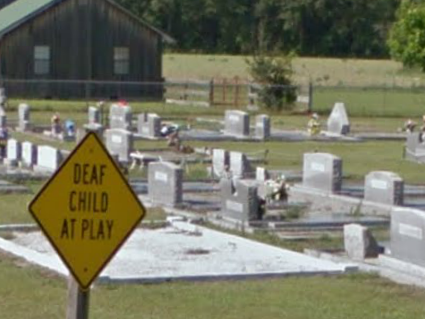A couple of earlier topics conglomerated conceptually in my mind to create my recent fascination with the U.S. state of Georgia’s Enigma. I discovered Enigma — it’s an actual town in Georgia that has about 1,200 residents — as I researched Shaped Like it Sounds (Street Edition). Enigma contained an Ell Street, which indeed resembled the letter L in certain orientations.
I noted in that earlier article that “Ell was the most common Letter-Shape road” although I failed to mention the Enigma example intentionally. I was preoccupied by the notion of Enigma so I set the topic aside for further exploration. Naturally I didn’t want to spoil the surprise by drawing attention to it prematurely. Enigma reminded me of Colorado’s Paradox, another place with a puzzling name. Paradox had an interesting history. I imagined Enigma hid an equally compelling origin.
A Puzzle to Name
Georgia.gov [link no longer works] explained, “Enigma earned its somewhat odd moniker when settlement founder John A. Ball quipped that he found it ‘a puzzle to name [the town] anyway.’” That wasn’t much to go on.
Several other sources amplified the explanation by claiming that an earlier incarnation had been called Gunn-and-Weston. Townspeople didn’t consider that a suitable name for a village with potential. Residents proposed Lax and Enigma, and Georgia state officials endorsed Enigma. Lax already belonged to another town.

Thus, Enigma earned its name and it later incorporated as a formal town. It gained a wonderful circular boundary as was so delightfully common in Georgia at the time, through the Acts Passed by the General Assembly of Georgia – 1906
“Sec 2. Be it further enacted by the aforesaid authority, That the corporate limits of said town of Enigma shall be as follows: One mile in a circle from the center of where the dirt road crosses the Atlantic Coast Line Railway Company in the town of Enigma in every direction therefrom.”
Enigma looked to be one of those little towns that many people think of as stereotypically “All American.” Photographic evidence seemed to support that, such as the image linked above and from other sources such as Brian Brown’s Vanishing South Georgia.
The mundane explanation behind the name left me wanting, though. Essentially, some guy in an off-hand remark a hundred-plus years ago noted that it was hard to name a town. That was about the extent of it. I guess residents were lucky he hadn’t suggested Stumped, Brain Freeze or Writer’s Block instead. So, Enigma it was and Enigma it remained.
Firecracker
With that mystery solved and with plenty of white space remaining to be filled in the article, I turned my attention to Enigma’s enigmas, of which there were plenty. Enigma had no shortage of perplexing situations. For instance, what about Miss Enigma Firecracker? I’d found an interesting twist on a beauty pageant where participants could dress only in “patriotic wear” with a 4th of July theme (“NO FLIPPERS, PAGEANT DRESSES, or HAIR PIECES”). This covered infants through adults, including any Miss who might actually be a Mrs., as long as she was not older than 25. Actually I guess it didn’t seem all that enigmatic other than the title, Miss Enigma Firecracker.
Stoner
Stoner Circle, on the other hand, was genuinely strange. In conformance with its Urban Dictionary definition, the street seemed utterly dazed and confused. It appeared on several major online mapping applications but it disappeared on the ground when viewed through Google’s satellite mode. Go ahead and toggle back-and-forth from map to satellite. Somewhere a resident on Stoner Circle chuckles as he munches Cheetos, while everyone guided there by GPS wonders “hey dude, what happened to the street?“
One More Enigma

Finally, why would a deaf child need to play in a cemetery?
And in case you were wondering…
The town of Lax didn’t exactly take off either. I bet the name is available.

Leave a Reply